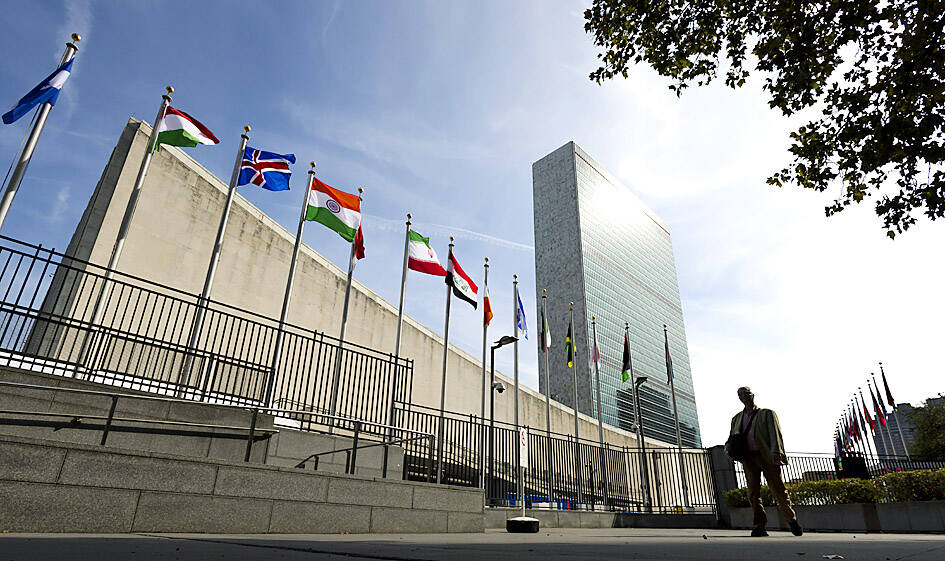Nine of Taiwan’s diplomatic allies yesterday called on UN Secretary-General Antonio Guterres to include the nation in the deliberations about technology and sustainable development at the UN Summit for the Future.
The 79th session of the UN General Assembly opened on Tuesday last week, with the high-level General Debate to run from Tuesday to Saturday next week.
The joint letter, dated Thursday, said the UN should acknowledge and address the malicious distortions to UN Resolution 2758 that have endangered the “status quo” in the Taiwan Strait and peace and stability in the Indo-Pacific region.

Photo: EPA-EFE
UN Resolution 2758, adopted by the UN General Assembly in 1971, recognizes the People’s Republic of China (PRC) as the “only lawful representative” of China, but does not state that it has sovereignty over Taiwan, as Beijing has insisted.
UN Resolution 2758 did not exclude Taiwan from meaningful participation in the UN system, the letter said, adding that the UN should seek appropriate measures to allow the nation’s contribution to the UN’s sustainable development goals.
The UN is called upon to adhere to strict neutrality in disputes by stopping the resolution’s erroneous citation, which had been used to deprive the right of the Taiwanese public and media to attend, observe or report on UN proceedings, the letter said.
Saint Vincent and the Grenadines Permanent Representative to the UN Inga Rhonda King was cited as saying it is unthinkable to exclude Taiwan from deliberations surrounding the Pact for the Future and Global Digital Contract.
Taiwan, which produces 90 percent of the world’s high-end chips and is a leader in artificial intelligence, is not permitted to take part in discussions about building digital guardrails and supply chains, King said.
Guatemalan Permanent Representative to the UN Carla Maria Rodriguez Mancia said that her government hopes more nations would join in supporting Taiwan’s inclusion in the mechanisms of the international body.
The matter is too important for the international community to continue to neglect, Mancia said.
It would be topically appropriate to allow Taiwan, a democracy possessing freedoms and technology, to be part of this year’s discussions about the future, which would impact generations to come, she said.
Taiwan’s meaningful participation in UN mechanisms and agencies would be a pragmatic move to enable its contribution to world affairs including digital governance, natural disaster relief and climate change, Mancia said.
Belizean Permanent Representative to the UN Carlos Fuller said that Taiwan is one of the island nations most threatened by rising sea levels, making its exclusion from UN conferences on climate warming an important issue.
Taipei Economic and Cultural Office in New York Director Tom Lee (李志強) said that Taiwan thanks its friends for their unwavering support for the nation’s bid to join the UN.
Diplomatic efforts this year would focus on correcting misconceptions about Resolution 2758, which has impeded Taiwan from contributing to the global push for sustainable development, he said.

US President Donald Trump yesterday announced sweeping "reciprocal tariffs" on US trading partners, including a 32 percent tax on goods from Taiwan that is set to take effect on Wednesday. At a Rose Garden event, Trump declared a 10 percent baseline tax on imports from all countries, with the White House saying it would take effect on Saturday. Countries with larger trade surpluses with the US would face higher duties beginning on Wednesday, including Taiwan (32 percent), China (34 percent), Japan (24 percent), South Korea (25 percent), Vietnam (46 percent) and Thailand (36 percent). Canada and Mexico, the two largest US trading

AIR SUPPORT: The Ministry of National Defense thanked the US for the delivery, adding that it was an indicator of the White House’s commitment to the Taiwan Relations Act Deputy Minister of National Defense Po Horng-huei (柏鴻輝) and Representative to the US Alexander Yui on Friday attended a delivery ceremony for the first of Taiwan’s long-awaited 66 F-16C/D Block 70 jets at a Lockheed Martin Corp factory in Greenville, South Carolina. “We are so proud to be the global home of the F-16 and to support Taiwan’s air defense capabilities,” US Representative William Timmons wrote on X, alongside a photograph of Taiwanese and US officials at the event. The F-16C/D Block 70 jets Taiwan ordered have the same capabilities as aircraft that had been upgraded to F-16Vs. The batch of Lockheed Martin

China's military today said it began joint army, navy and rocket force exercises around Taiwan to "serve as a stern warning and powerful deterrent against Taiwanese independence," calling President William Lai (賴清德) a "parasite." The exercises come after Lai called Beijing a "foreign hostile force" last month. More than 10 Chinese military ships approached close to Taiwan's 24 nautical mile (44.4km) contiguous zone this morning and Taiwan sent its own warships to respond, two senior Taiwanese officials said. Taiwan has not yet detected any live fire by the Chinese military so far, one of the officials said. The drills took place after US Secretary

CHIP EXCEPTION: An official said that an exception for Taiwanese semiconductors would have a limited effect, as most are packaged in third nations before being sold The Executive Yuan yesterday decried US President Donald Trump’s 32 percent tariff on Taiwanese goods announced hours earlier as “unfair,” saying it would lodge a representation with Washington. The Cabinet in a statement described the pledged US tariffs, expected to take effect on Wednesday next week, as “deeply unreasonable” and “highly regrettable.” Cabinet spokeswoman Michelle Lee (李慧芝) said that the government would “lodge a solemn representation” with the US Trade Representative and continue negotiating with Washington to “ensure the interests of our nation and industries.” Trump at a news conference in Washington on Wednesday announced a 10 percent baseline tariff on most goods